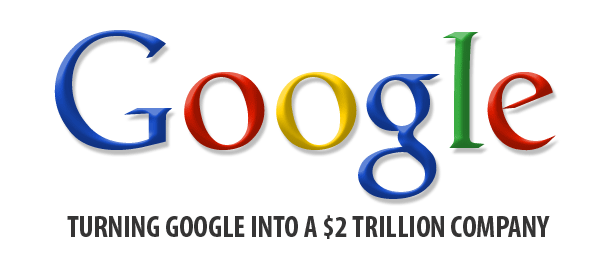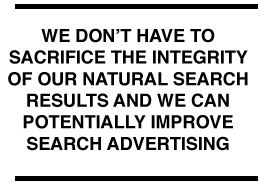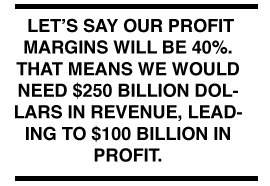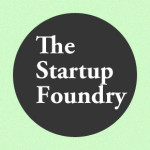Welcome to The Startup Foundry.
A Look Forward from 1999: Turning Google into a $2 Trillion Company
Guest Author
TSFPublished: Jul 25, 2011 3:04 pm

The following is heavily inspired by Charlie Munger’s talk, Turning $2 Million into $2 Trillion, he is undoubtedly one of the greatest thinkers of our time.
It is early 1999 in Palo Alto and your two friends Larry and Sergey are complaining to you how they want to go back to conducting academic research but this new project of theirs, Google, is taking up a lot of their time. They sound enthusiastic that they might be able to make half a million dollars each and improve the search results for the potential acquirer but more than anything, they don’t want to be bothered with having to run a company.
You have found the project that your friends have been working on very interesting and have taken the time to read the academic paper describing the Google search engine. You see Google’s potential to be a world changing business. You need to convince the friends of yours to work on building Google into a business of their own rather than selling the company. Larry and Sergey have an idealistic worldview and find it unfortunate that “search engine technology [remains] largely a black art and [that search engines are] advertising oriented.” Furthermore, they “expect that advertising funded search engines will be inherently biased towards the advertisers and away from the needs of the consumers.” Larry and Sergey “believe the issue of advertising causes enough mixed incentives that it is crucial to have a competitive search engine that is transparent and in the academic realm.”
You are more of a business-minded capitalist than Larry and Sergey but you simultaneously admire their idealism. How can you convince them how great of an opportunity Google is to Larry and Sergey both business and world-change potential wise? To add a bit of challenge, let’s say you have to convince them that Google can be a $2 trillion dollar company by 2050, after all they are long term thinkers and how Google can do a lot of good for the world in the process. In doing your analysis, it will be helpful to use Charlie Munger’s five helpful notions and to know all the elementary ideas that come from all the basic college courses, as taught in 1999. You don’t know anything about what has happened past early 1999. To sweeten this hypothetical situation, let’s say that if you can convince them to stick with the business, they will give you a 10% share of the company upon joining the company.
You have fifteen minutes to make your pitch. What do you say?
 The big “no-brainer” decisions that, to simplify our problem, should be made first are as follows: First, in order to create something worth $2 trillion we will need to be focused on a combination of licensing our search service to portals that already have many users, such as Yahoo! and America Online, as well as well as having a branded service that provides direct access to our users and builds good will them. We must trademark “Google” and make it into a strong brand name that users trust, like Yahoo! but better. With the licensing route we will have early access to a large number of users which will allow us to have significant data to test and improve our search engine. Preferably, we can have our brand on these portals’ pages as well to let their users know who the best search provider really is. Later on, we can focus more heavily on our own direct to user service, which will have higher margins and will help further build our brand. Unfortunately, it looks like advertising is the best monetization model as it is what has done the best so far for search engines. Fortunately, we don’t have to sacrifice the integrity of our natural search results and we can potentially improve search advertising akin to how we are improving search, and as you guys say “there will always be money from advertisers who want a customer to switch products, or have something that is genuinely new”. Yes, “the better the search engine is, the fewer advertisements will be needed for the consumer to find what they want” but we can use ads only when they add value to the user. We saw what happened to OpenText, we can’t let the same thing or anything remotely similar happen to us.
The big “no-brainer” decisions that, to simplify our problem, should be made first are as follows: First, in order to create something worth $2 trillion we will need to be focused on a combination of licensing our search service to portals that already have many users, such as Yahoo! and America Online, as well as well as having a branded service that provides direct access to our users and builds good will them. We must trademark “Google” and make it into a strong brand name that users trust, like Yahoo! but better. With the licensing route we will have early access to a large number of users which will allow us to have significant data to test and improve our search engine. Preferably, we can have our brand on these portals’ pages as well to let their users know who the best search provider really is. Later on, we can focus more heavily on our own direct to user service, which will have higher margins and will help further build our brand. Unfortunately, it looks like advertising is the best monetization model as it is what has done the best so far for search engines. Fortunately, we don’t have to sacrifice the integrity of our natural search results and we can potentially improve search advertising akin to how we are improving search, and as you guys say “there will always be money from advertisers who want a customer to switch products, or have something that is genuinely new”. Yes, “the better the search engine is, the fewer advertisements will be needed for the consumer to find what they want” but we can use ads only when they add value to the user. We saw what happened to OpenText, we can’t let the same thing or anything remotely similar happen to us.
Second, our service will need to be used all around the world by billions of people. Currently, there are 171.25 million worldwide internet users and the number of users have been growing rapidly. We can count on this number continuing to grow, although it is hard to know exactly how fast. Moore’s law will continue and prices will drop for computers and internet access. Simultaneously the importance of computers and the internet will increase as the “new economy” grows in importance and reach. Third, we have to be laser focused on providing the best search service possible. We currently have the best search service. We just need to keep up with improving the search engine and staying ahead of the competition. Unlike Microsoft, which has won largely due to customer lock in, users can switch search providers with the click of a mouse. Thus quality is the most important thing.
We will next use numerical fluency to ascertain what our target implies. A lot of this is guess work. By 2050, the world population estimate is 9,000,000 people. The Internet as well as progress in general will change how billions of currently impoverished people live today. Let’s say by 2050, 75% of the world’s population will use the Internet. As the index of the number of sites rise, the more important search will be, to find the right site, thus we can be fairly confident that the vast majority of Internet users will use search. To make the numbers convenient let’s say that 2/3rds of the world population will use a search engine. In order to reach our financial goal, we will have to be the front runner. Search is the type of market where the winner will take most because each user wants to use the best search engine. Let’s say 2/3rds of searchers will use Google. Okay, we will (hopefully) have 4 billion Google users in 2050.
 On a top-down level, let’s see how much profit and revenue we will need. The current craziness in P/E ratios in the stock market will find a way to sort itself out, either through continued high growth or more likely through some type of crash at some point but it is very difficult to know when this will occur. Stock prices will regress back to a more standard P/E ratio. Let’s say that Google’s P/E ratio in 2050 will be 20. Furthermore, the margins on Internet businesses tend to be quite good because we only have to make our product once and can distribute it all around the world through the Internet. Currently, the required infrastructure is very expensive but infrastructure prices will only continue to fall. As far as employees, we will need a ton of brilliant engineers which is expensive but luckily is a fixed cost rather than a variable cost. Also, we will probably have to pay a fair portion of our advertising revenue to our distribution partners. Let’s say our profit margins will be 40%. That means we would need $250 billion dollars in revenue, leading to $100 billion in profit. These are daunting figures but potentially doable.
On a top-down level, let’s see how much profit and revenue we will need. The current craziness in P/E ratios in the stock market will find a way to sort itself out, either through continued high growth or more likely through some type of crash at some point but it is very difficult to know when this will occur. Stock prices will regress back to a more standard P/E ratio. Let’s say that Google’s P/E ratio in 2050 will be 20. Furthermore, the margins on Internet businesses tend to be quite good because we only have to make our product once and can distribute it all around the world through the Internet. Currently, the required infrastructure is very expensive but infrastructure prices will only continue to fall. As far as employees, we will need a ton of brilliant engineers which is expensive but luckily is a fixed cost rather than a variable cost. Also, we will probably have to pay a fair portion of our advertising revenue to our distribution partners. Let’s say our profit margins will be 40%. That means we would need $250 billion dollars in revenue, leading to $100 billion in profit. These are daunting figures but potentially doable.
Now let’s get down to the nitty-gritty level of revenue per search query. The average user will probably do somewhere between 10-20 queries per day. Let’s keep the numbers simple and say that the average user will make 500 queries per year. Thus there will be 2 trillion queries a year on Google. Let’s say 20% of those are related to a commercial interest in some way and of those 20% of those will lead to clicks on our advertising system leading to 80 billion clicks on ads. That means that our average amount earned per click would need to earn Google $3.125. This figure sounds unrealistic now but thinking in reverse, with inflation and GDP growth over the next 50 years factored in at a rate around 3% a year, the figure in the 1999 economy/dollar would be more like $0.70 per click. Now, this figure is looking reasonable.
If even a quarter of the hype about the new economy pans out, more and more of what we do every day will move online. Looking at how much the world has changed in just the past decade it is impossible to project what the world will look 51 years from now but we can be sure that technology and the Internet in particular will play a central role. As the number of uses and the amount of information on the Internet expands, search will be the Internets killer app. Most search terms will have no economic value, such as looking for Abraham Lincoln’s birthday but search will be easily monetizable for commercial related queries. Why not use a search engine instead of a yellow pages when it comes time to look for a local service provider? This type of activity can expand across many types of commerce (e-commerce, local, SMB) and will move a lot of marketing dollars online and especially into search. Ads are more expensive per reader in Fortune magazine than in People, the same type of concept will apply to search, only with search the level of granularity in targeting will be even higher leading to higher prices. You can target users not just on demographic in wide batches, but on the actual term that they have searched. We can borrow what Bill Gross at GoTo is doing, but only improve on it with our better engineering know how.
We must understand the essence of our business in proper elementary academic terms. From our introductory course in psychology, we can see that in essence we are going into the business of creating and maintaining conditioned reflexes. The need to seek out information is the stimuli and the use of the trademarked “Google” search service will be the desired response. Conditioned reflexes are created and maintained, as an intro textbook in psychology will tell you, by operant and classical (Pavlovian) conditioning. In order to obtain lollapalooza effects, we must use both conditioning techniques to the utmost level.
For operant conditioning, we need to maximize the reward of using our search engine and minimize the possibility that the desired reflex, once created by us, could be extinguished through the operant conditioning of a competing search engine . The major reward that our search engine offers is allowing our users to find the information that they desire as quickly and easily as possible. Minimizing the difficulty and time required for using our search engine will maximize the reward to effort ratio. Darwinian natural selection has most likely selected for individuals who have been able to obtain additional information since doing so would increase their fitness to survive and reproduce. Thus, the obtainment of additional information is neurally programmed to act as a reward.
Using this information we must make our search engine as quick, simple and accurate as possible. In order to prevent competitors from copying our search algorithm, we will have to protect this information and keep it a secret. Overtime, we can personalize the search results for individual users, through the information we have about our users, and we can improve our overall search service in general by factoring in our users search habits thus better serving our users and making it more difficult for competitors to compete. We will need our search engine to be the best possible in every category so that no competitor can gain a foothold in any vertical. After all, if a competitor’s product is never tried, it can’t act as a reward creating a conflicting habit. Every spouse knows that.
Next, let us consider classical conditioning, commonly know as Pavlovian conditioning. Pavlov conditioned his dog to salivate at the ringing of a bell due to the trained association between the ringing of a bell and the giving of food to his dog immediately afterward. Overtime, this led his dog to salivate at the sound of a bell, even without the giving of food. At Google, we will be able to condition our users to think “Google it” whenever they want to look for information. Larry Page’s idea of making Google a transitive verb was brilliant and will make it so that “to google” will be synonymous for search in the same way that a Kleenex is synonymous with a tissue. This association will be very powerful and will save us a lot of money on advertising.
Our search service is so much better than any competitor, that simply allowing users to try our search service will lead to their delight and word of mouth growth. The word of mouth growth will be aided by the principle of social proof, which is in esseence: the monkey see, monkey do principle. As some people begin to use Google, others will see and hear that their friends and colleagues use Google and the service will grow. Potentially at some point in the distant future, we will want to use conventional advertising channels to get our message across and build the association between Google and positive things but for now we can focus all our energy on building the best possible product. Yes, people want to drink Coca-Cola and Budweiser because they see ads of beautiful women drinking such beverages in ads and their names as sponsors of sporting events. The same idea probably doesn’t apply for a search engine as well, since search is primarily a utility.
The combination of operant conditioning, Pavlovian conditioning and powerful social-proof effects will lead to a multi-factor-triggered lollapalooza effect we need. This will lead to a great amount of traction and brand equity. Though, first we are going to need some way to start this autocatalytic reaction, we will need some initial distribution.
The distribution strategy of our business will be simple. There are only two practical ways to distribute a search engine, the first is having users go direct to our website and the second is to distribute our search engine through partnerships with other websites and browser makers. Of course, having users go direct to Google is preferable because it is better for our brand and we won’t have to split any of the advertising revenue. When we distribute our search service with partners, it is very important that the search results are still branded with the Google brand name so we can start building our trio of desired psychological effects.
Even though we will prefer users to go directly to Google, we will have to be willing to form as many partnerships as possible so that Google is the default search engine at all or at least most major portal sites and on most browsers. A large number of people are very lazy and/or technology inept and will use whatever is the default and it is very difficult to make these users change their habits. A large amount of our revenue may go to these partnership deals but making them will be very worthwhile, especially since we will be able to get our brand out there with these branded distribution deals and because we would not be able to reach these users otherwise.
While we may be able to patent large portions of our search engine algorithm, software patents seem kind of evil, so we should be primarily focused on just creating the best possible search engine and not worry too much about patents. We should just keep our search algorithm a secret. There will be much mystery around our search algorithm, just as there is with Coca-Cola’s secret recipe. There will be something magical, dare I say a “black art” around how our search engine results are ranked, but as long as we have the highest level of integrity around our search results and help users find what they are looking for better than the competition, we should be good.
Search is a market that already has a lot of competition but as the market grows, there will be even more fierce competition. As the search algorithms get more complex and the capital requirements to build a good search engine grow, there will be only a handful of companies that will be able to create and run a search operation. Right now, our competitors’ technology sucks, but overtime we can expect that they will improve and potentially even catch up with Google. This means that we will have to constantly invest very heavily in improving our search engine in order to stay ahead and work hard on developing our brand initially so even if a competitor does catch up, we will remain the preferred search provider for most users. There may be related online service opportunities later on as well, especially leveraging all of the advertiser information that we will have since we will become a go to place for advertisers of all types.
Our final reality check for our business plan is thinking about what we will want to avoid. We will think in reverse like Jacobi. Three things come to mind.
First, we must avoid hiring anybody who is not of the highest quality and intelligence. Search is a very difficult engineering problem and will require many of the brightest minds in order to solve it. Intelligent individuals highly value working in the company of other intelligent individuals. Furthermore, if we are very selective about our hiring we will make earning employment at our company scarce, thus causing more people to want to work at Google.
Second, we must avoid becoming a “regular” company. This is less for business reasons and more for idealistic ones. We need to make sure that we are doing something good for the world beyond simply making money. Also, as we grow, having a larger and more important mission than that of the typical company will allow us to continue to recruit and retain many of the brightest minds. Search is a very interesting problem but we need a way to truly express how grand the problem is. A mission statement somehow related to how we will organize the worlds information and make it so anyone can easily access whatever information they are looking for. We will need to refine the wording but that concept will help make our employees intrinsically motivated and will make them proud to work at Google. Furthermore, working towards this mission, even without the monetary incentive, is a great reason to continue your focus on building Google as our product will dramatically improve the life of billions of people as they will have all of the world’s information at their fingertips.
Third, with so much success ahead, we must avoid bad effects from envy, an unfortunate part of human nature. As recognized by Aristotle, the best way to avoid envy is to deserve the success we get. We will be fanatic about providing the highest quality of service in order to earn our success. Also, since we are charging advertisers instead of consumers, consumers will be happy to be able to use such a powerful and useful service for free.
Well, that is my solution to how a company trying to sell itself for $1 million dollars could turn itself into a $2 trillion dollar company and change the world for the better in the process. Google’s current market cap of $170 billion will need to grow at 6.525% percent per year over the next 39 years in order to reach the target $2 trillion value by 2050. In reality it turns out that the Google guys didn’t get the initial $1 million offer they were searching for so they didn’t need end up needing any convincing. Nevertheless, this work shows the power of elementary academic ideas, especially those of psychology, when aptly applied and brought into play by the helpful notions.
Follow us on Twitter @startupfoundry or on Facebook.
-
👉 Filed Under.
Categorised in: Strategy
Get Connected:
If you like startups, join our weekly mailing list. Good startup content, no fluff.
👇

Hi, I'm Paul Hontz.
I'm a YC alumn and I love startups. I created TSF to highlight companies I find interesting. You can learn more about me here.
Recent Posts:

The Story of Cruise (YC W14): How 4 people built a self driving car in 7 months.
Jul 8, 2014 2:35 pm

I Want To Write About Your Startup – Relaunching TSF
Jan 17, 2014 5:14 pm

How To Do B2B Email Sales
Nov 23, 2011 2:12 pm

Nasty Bug in iOS 5.0.1 OTA Update screws up Address Book on the iPhone 4S
Nov 10, 2011 11:56 pm

It’s Easier to Answer to Your Code Than Your Customers
Oct 28, 2011 2:25 pm


